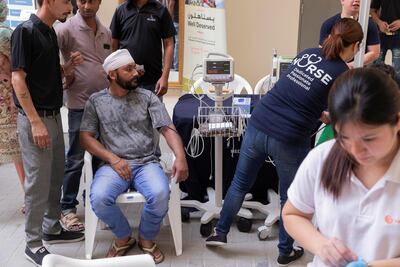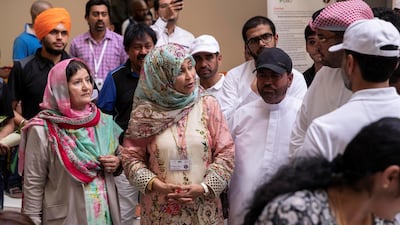Labourers are suffering from mental health issues in silence, the Pakistan Association of Dubai has said, as well as other health issues such as undiagnosed diabetes or complications associated with a bad diet.
On Friday, a group of doctors from Dubai hospitals, including American Hospital and Al Baraha Hospital, conducted health check-ups for labourers in a Jebel Ali camp. More than 300 workers were told to eat healthy, control their sugar intake and check blood-pressure levels.
Dr Nighat Aftab, president of the PAD’s medical wing and a consultant gynecologist in Latifa Hospital said that there had been major improvements and enhancements in labour accommodation. “Previously, rooms were very small and there were not good facilities. In this camp, the rooms are spacious and fully equipped,” she said.
However, depression is still one of the main causes for concern among workers living in these types of communities.
“Labourers need psychological help, especially if they are depressed. They are away from home and need support. They might instead turn to smoking, consuming alcohol or could even commit suicide.
"They are alone and I am not sure about the types of facilities provided in labour camps for relaxation,” she said. Bullying is also among the main causes of distress, and PAD are now offering counselling sessions.

Dr Aftab said the mental health of workers can also be affected by salaries not being paid on time.
Employers who fail to pay wages within ten days after their due date face harsh punishments, according to a decree introduced by the Ministry of Human Resources and Emiratisation. Yet despite strict rules, some companies try to violate the law.
“If their salaries were not paid on time, it is very depressing. Most of the workers take [financial] care of their families – their families will keep on calling and the labourers will be depressed as they are unable to provide help for them."
Mohammed Ehais, 35, said he misses his family and worries he does not earn enough to support their needs.
“I am very tired and I feel sick. I work for eight hours a day and earn only Dh900 a month. I think a lot about my wife and children back home, fearing not to meet their expenses,” he said.
Mohammed Asif, a 25-year-old maintenance helper who provides for his wife, two children and mother, said he struggles to stick to healthy eating advice.
“I am not eating healthy food. I am far away from home to support my family and buying healthy food costs more,” he said.
________________
Read more:
Outdoor workers call for crackdown on companies flouting midday break rules
________________
“Doctors have advised me not to sleep after eating. The problem is that I finish work in the evening, eat and then sleep.”
Mr Asif said that when he feels tired, he usually takes medicine without referring to a doctor.
“I do not have enough money to go to a doctor. I might take Panadol or a type of painkiller and go to work," he said.
Rizwan Fancy, PAD's director of public relations, said that some of the labourers are diabetics and are not aware of it.
"Most workers do not care about their health at all," he said. "That's why we conduct regular check-ups at different labour camps. We raise awareness about health issues. If the labourers are not healthy and fit, they will not survive for their families.”

